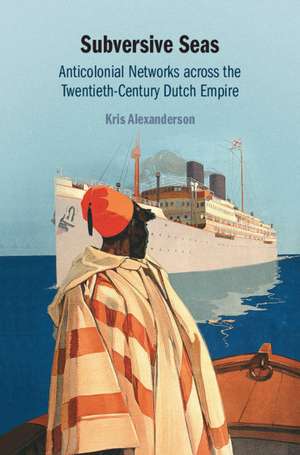Subversive Seas: Anticolonial Networks across the Twentieth-Century Dutch Empire
Autor Kris Alexandersonen Limba Engleză Hardback – 24 apr 2019
Preț: 698.50 lei
Preț vechi: 784.83 lei
-11% Nou
Puncte Express: 1048
Preț estimativ în valută:
133.70€ • 145.28$ • 112.38£
133.70€ • 145.28$ • 112.38£
Carte disponibilă
Livrare economică 31 martie-14 aprilie
Preluare comenzi: 021 569.72.76
Specificații
ISBN-13: 9781108472029
ISBN-10: 1108472028
Pagini: 312
Ilustrații: 16 b/w illus. 1 map
Dimensiuni: 159 x 235 x 20 mm
Greutate: 0.64 kg
Editura: Cambridge University Press
Colecția Cambridge University Press
Locul publicării:Cambridge, United Kingdom
ISBN-10: 1108472028
Pagini: 312
Ilustrații: 16 b/w illus. 1 map
Dimensiuni: 159 x 235 x 20 mm
Greutate: 0.64 kg
Editura: Cambridge University Press
Colecția Cambridge University Press
Locul publicării:Cambridge, United Kingdom
Cuprins
Introduction: transoceanic mobility and modern imperialism; Part I. At Sea: 1. Kongsi Tiga: security and insecurity on Hajj ships; 2. Java-China-Japan Lijn: Asian shipping and imperial representation; 3. The Dutch mails: passenger liners as colonial classrooms; Part II. In Port: 4. Pan-Islamism abroad: regulation and resistance in the Middle East; 5. Policing communism: ships, seamen, and political networks in Asia; 6. Japanese penetration: imperial upheavals in the 1930s; Conclusion: oceanic decolonization and cultural amnesia in the twenty-first century.
Recenzii
'Alexanderson demonstrates that we cannot understand imperialism by simply focusing on the terrestrial claims of colonial powers. Rather, she reveals the myriad ways maritime networks, including actual ships themselves, helped define colonial structures and also provided unique, cosmopolitan spaces of connection for colonial subjects. Subversive Seas makes crucial contributions to Southeast Asian history, maritime history, and transnational/world history.' Heather Streets-Salter, Northeastern University, Massachusetts
'Extensively researched and gracefully written, Subversive Seas demonstrates that Dutch shipping companies and maritime priorities both informed and reflected colonial policies during the period that would prove to be the twilight of Dutch imperial rule in Asia. Scholars working in numerous subfields - science and technology studies, maritime history, imperial history, decolonization studies, East Asian history, and modern Dutch history, among others - will value the insights Alexanderson offers in this important book.' Jennifer L. Foray, Purdue University, Indiana
'Elegantly written, a joy to read, and aided by plentiful footnotes, Alexanderson's study is all the stronger for its concluding discussion of the decolonization of Indonesia in the post-1945 era and the subsequent historiographical 'decolonization of the Dutch colonial past', to which her book ably contributes.' Nicholas J. White, Journal of Interdisciplinary History
'Extensively researched and gracefully written, Subversive Seas demonstrates that Dutch shipping companies and maritime priorities both informed and reflected colonial policies during the period that would prove to be the twilight of Dutch imperial rule in Asia. Scholars working in numerous subfields - science and technology studies, maritime history, imperial history, decolonization studies, East Asian history, and modern Dutch history, among others - will value the insights Alexanderson offers in this important book.' Jennifer L. Foray, Purdue University, Indiana
'Elegantly written, a joy to read, and aided by plentiful footnotes, Alexanderson's study is all the stronger for its concluding discussion of the decolonization of Indonesia in the post-1945 era and the subsequent historiographical 'decolonization of the Dutch colonial past', to which her book ably contributes.' Nicholas J. White, Journal of Interdisciplinary History
Notă biografică
Descriere
This revealing portrait of the oceanic Dutch Empire exposes the maritime world as a catalyst for the downfall of European imperialism.
